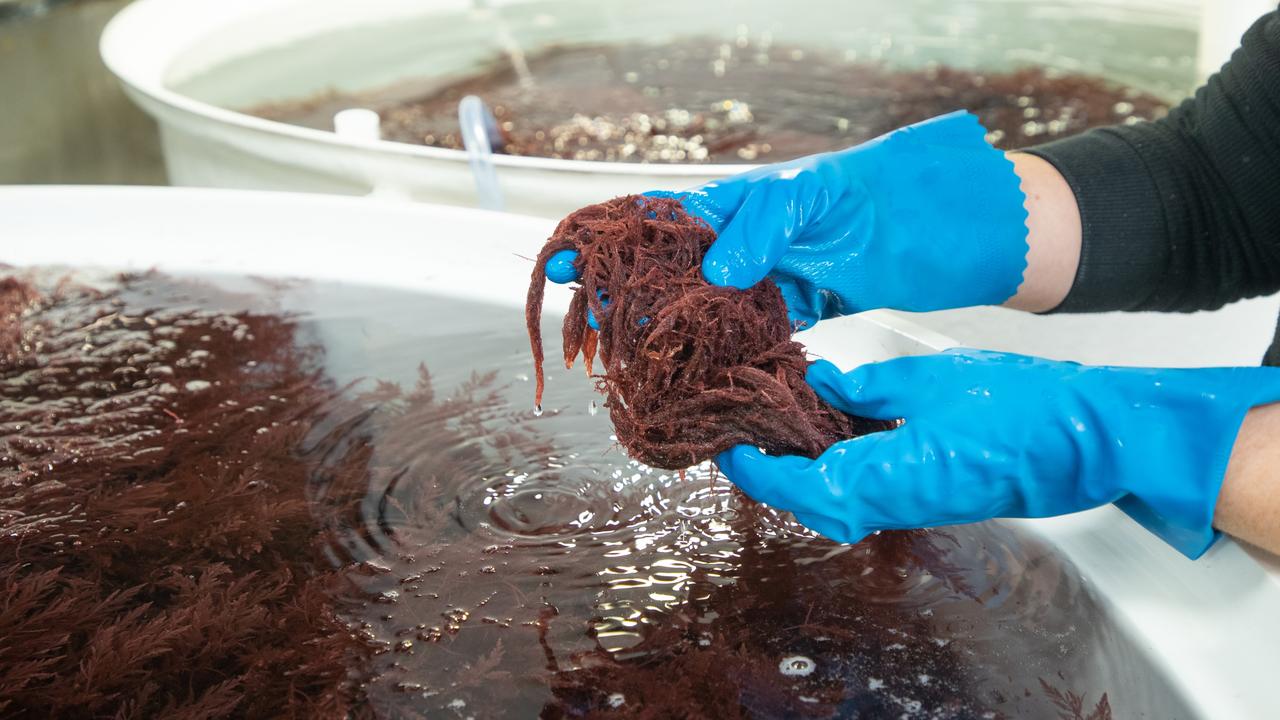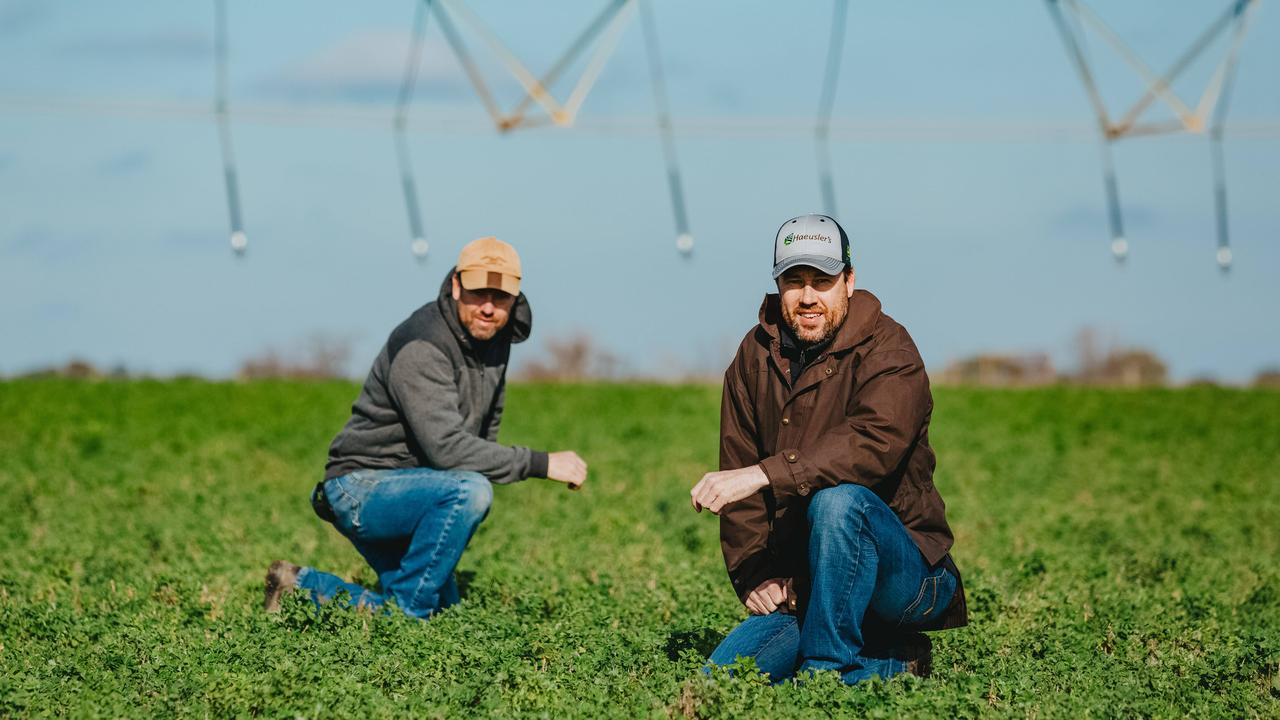Leap Farm: City family takes on challenge of Toggenburg goats
THE Fields’ brave leap on to a goat property in Tasmania is paying off, with their milking herd and artisan cheeses going from strength to strength, writes TONY FAWCETT.
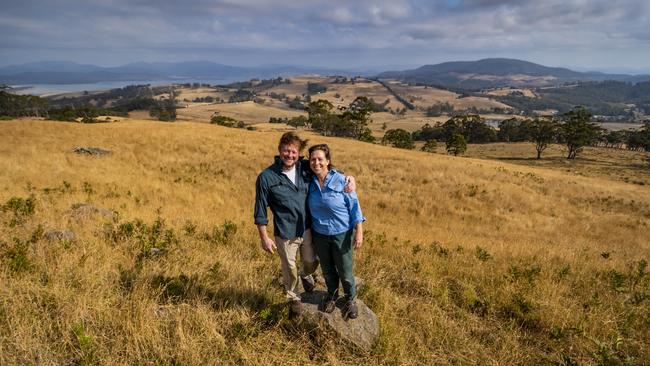
IAIN and Kate Field seemingly had it all — a home on Sydney’s Northern Beaches and two fascinating, challenging careers.
As a university lecturer and ecology researcher, Iain’s projects were as diverse as studying sharks in Northern Australia, and Kate, a medical doctor, worked in emergency medicine where no day was like another.
Yet this pair was disillusioned with city life, fed up with hours a day spent in traffic and materialistic city attitudes.
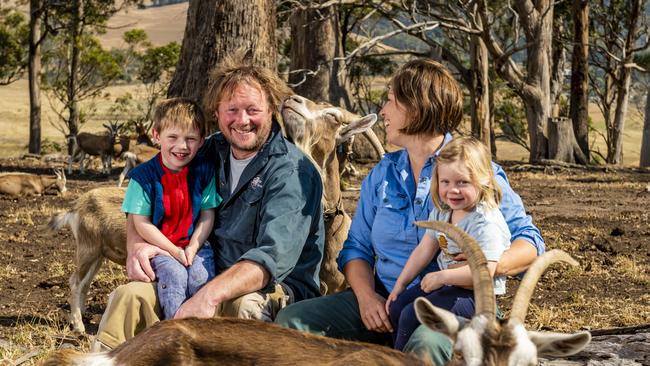
Iain had become dissatisfied with the education system and disenchanted with some university procedures. He also was nagged by guilt he was “a bit of a fraud”, teaching about natural resources and farmland but never having actually run a farm.
Iain and Kate knew there was a better, more fulfilling way. The country called.
The two had met in an idyllic situation in Tasmania when Melbourne-born Kate was studying at University of Tasmania’s School of Medicine and UK-born Iain was in the first year of his PhD, and they yearned for similar times.
TOLPUDDLE GOAT CHEESE A FAMILY AFFAIR
FIFTH GENERATION REAPS REWARDS OF 40,000 ON-FARM TREES
BIOLOGICAL WORM CONTROL FOR LIVESTOCK STANDS UP TO SCRUTINY
Cheese would be their passport. They both loved the stuff. Their love for one another, says Kate, was founded over a wheel of brie.
When Kate paid for a cheesemaking course for Iain’s birthday, then more cheesemaking courses followed, the die was set.
“We were making cheese at home in Sydney and the cheese we made was always better than what you could buy at the supermarket,” Iain says. “I suppose in a very arrogant, naive way I thought I could make good cheese.”
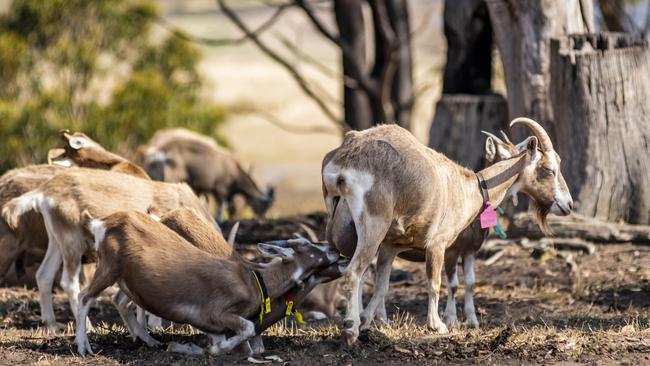
DREAMS COME TRUE
By 2011, their country dreams had firmed into definite plans.
When 107 hectares on the side of the Ragged Tier overlooking Marion Bay and Bream Creek in southeast Tasmania came up for sale, they moved quickly.
They made an offer, it was accepted, and they had six months before move-in.
“I had to find a job down here and we had to sell our house in Sydney so we could pay for this caper,” Kate recalls.
“I moved in March 2012 while Iain was in Antarctica (studying seals). I packed up the house and moved our two dogs and everything to Hobart (where Iain’s parents live).
“People thought I was nuts … ‘what are you doing leaving Sydney, the best place in the world, when you have a house and the best job in the world?’
“Yet to us it seemed that people’s lives there were solely based around consumerism. They didn’t want to necessarily know where their food came from. They just wanted the new big car, the big house on the beach.”
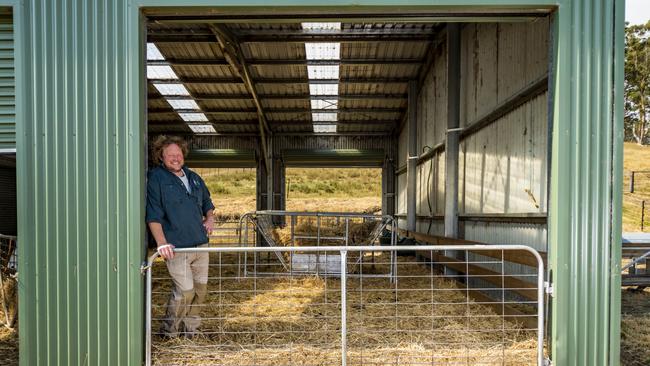
HARD LEARNING CURVE
Today Iain and Kate have attained their dream, producing five artisan goat milk cheeses under the Tongola brand at Leap Farm.
Now with two children — Zoe (known at home as Pippi), 2, and Hamish, 4 — they say they couldn’t be happier.
Yet they acknowledge it hasn’t been easy. Long days are the routine, with Iain frequently working dawn to beyond dusk, and Kate juggling life as a mother and farm worker, with three 10-hour shifts a week as a consultant emergency doctor in Hobart.
“We kind of knew what we were getting into, but nothing quite prepares you for the reality of your own farm,” Kate says.
Iain adds: “We went into it with open eyes. We had both worked pretty hard in the past and it wasn’t as though we were afraid of hard work. And it’s a lot of fun.”
While the property came with a couple hundred goats — a mixed collection of Rangelands, Cashmeres and Cashmere-crosses that had been used for weed management — they knew these weren’t the basis for a dairy herd.
To retain income while establishing, they bought beef cattle from the previous farmer and quickly had 50 cows with calves at foot.
Soon they were selling beef and goat meat, which provided financial breathing space, although the goats necessitated an expensive fence reinforcement program early on.
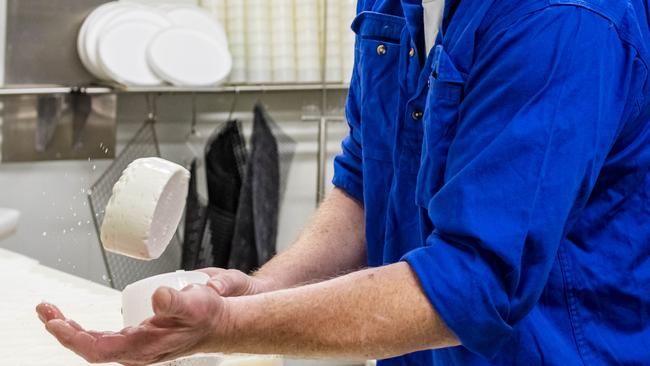
LEAPS AND BOUNDS
Their foray into goat cheesemaking was slow to start.
Research told them the best dairy goats for their hilly and sometimes damp area were “Toggies”, even-tempered and comparatively trouble-free Swiss Toggenburg animals that produce soft milk suited to cheesemaking.
In their search for Toggies, they soon discovered Hans Stutz and Esther Hausermann, who had been running a successful goat cheese business, Tongola, based on Toggenburgs in Tasmania’s
Huon Valley.
“In 15 years, Hans and Esther had built up a solid brand of excellent cheese but they had largely gone under the radar, despite winning Delicious Produce Awards, having their cheese served at the Melbourne Cup and supplying top Hobart restaurants,”
Iain says.
Importantly, their goats, a closed herd, had been quarantined from caprine arthritis encephalitis virus, a disease prevalent in goats in Tasmania and the mainland.
“When we went to visit them there was a really quirky situation,” Iain says. “They’re interesting, lovely and kind people, and goats have been their passion for 20 years or more.
“I said to them, ‘look, I’d like to buy 30 goats off you, please’.
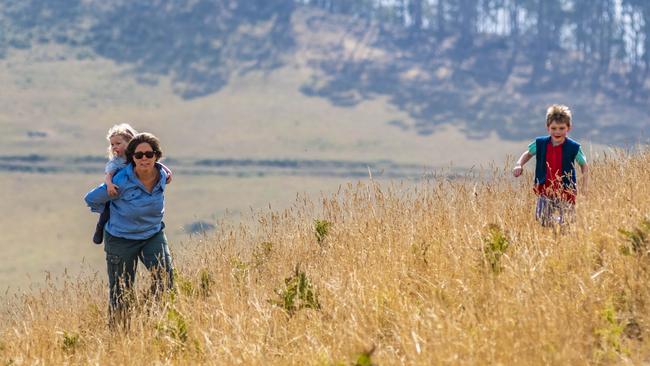
“They looked at me quizzically and said, ‘no, 10 kids, and you can raise them and see how you go. If you do well we might sell you some more’.
“I was grateful for that now, because they did sell us more a couple of months later, and they were very happy with what we had done.
“But it was a great learning experience and we used that to our advantage. We had two years then before we started milking, two years to learn a lot about goats and goat handling, husbandry, management … and then the dairying process.
“It gave us lead time to build our dairy rather than having to rush it. We visited seven other dairies before we built ours, and we were able to incorporate all their good points.
“We started off with 18 kids and raised them for two years, then got a few more from Hans and Esther and ended up with 24 goats we were milking in the second year.
“It wasn’t really worthwhile us making cheese at that point so we teamed with Hans and Esther, supplying them all our milk. I’d deliver milk to them twice a week and one day a week would stay down with them and help make cheese.”
The big turning point for the business came in winter 2017, when Hans and Esther, seeking to downsize their business, reached an agreement with Iain and Kate to take over Tongola Cheese, moving the brand to Leap Farm.
Since then Leap Farm has literally gone ahead in leaps and bounds, now boasting a goat house, husbandry shed, purpose-built dairy and cheesery.
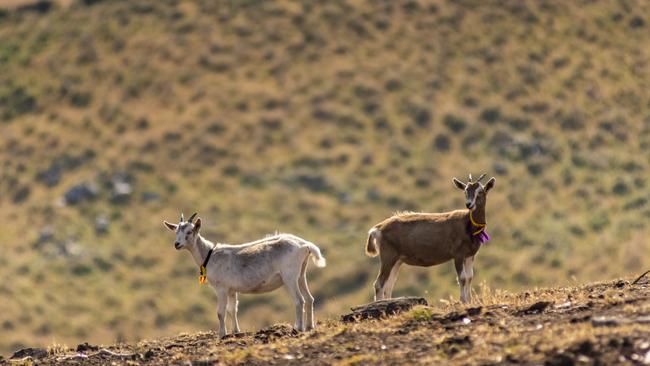
GOAT NUMBERS
The couple is still growing the herd and currently milks 65 goats, with the aim of reaching 90 in a few years.
“We looked at a couple of other strong goat dairies in Australia and at their business models and worked out 80 goats was a good number,” Iain says.
Unlike other goat cheese operations, they milk just once a day, except for the first month of the season, and only milk within the natural lactation cycle of the goats, with no milking over winter.
“I call it ethical dairying in that we don’t have to get rid of the little boys after birth, we grow them on so they experience a pastured life,” Kate says.
Goats are milked in the morning and does are immediately reunited with their kids in the paddock.
“So they spend time with the mum and suckle during the day, which we think improves udder health,” Kate continues.
“It certainly reduces mastitis rates because they are constantly being drained.”
About an hour before sunset the goats instinctively walk home.
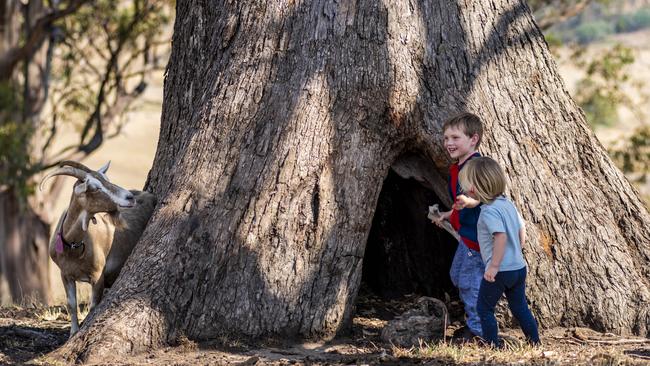
Says Iain: “The mums happily walk down the laneway, look back at their kids and go ‘Meehh’, and keep walking. After the first week the mums are quite happy to leave the kids for the evening.
“The mums then sleep in their shed on a composting hay floor at night, which means they don’t have to exert energy in keeping warm.
“So overnight the girls make more milk, and then we harvest that milk in the morning.
“It’s a very soft dairy process.”
The male kids are grown on for 12-18 months for meat.
On average, each milking goat supplies between 1.8 and two litres of milk a day.
While this is below that of some commercial dairies, Iain and Kate believe the health of their goats, their own peace of mind and the quality of product is worth it.
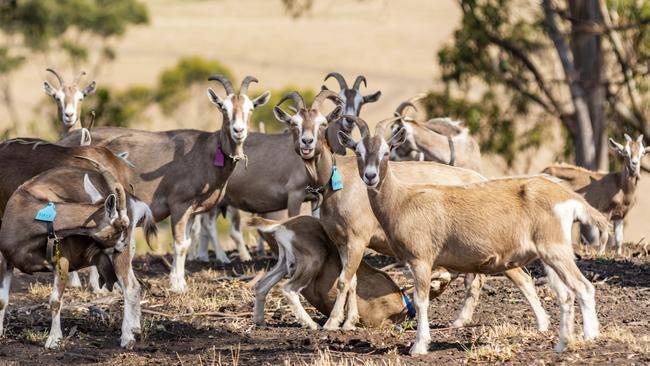
THE CHEESES
Today Tongola produces five cheeses — Curdy (a fresh lactic curd cheese), Capris (a salted and hooped curd cheese), Bloom (a creamy camembert-style cheese), Zoe (a ripened fresh lactic curd cheese with a white mould rind, that won a Delicious award last year) and the Big B (a cooked curd, semi-hard, smear-rind cheese).
They sell and distribute the cheeses themselves, mainly to delis, grocers, cafes and restaurants in Hobart and surrounds, and sell direct at the local farmers market.
Restaurants take about 70 per cent of their cheese as fresh curd.
Retail prices vary from $45 to $80-$90 a kilogram for specialty cheeses, with curd selling for $6.50 (125g) and Capris $8.50 (120g) at the farmers’ market.
Iain estimates output at about 150kg of cheese a week.
Curdy is their most popular cheese, particularly with cafes and restaurants.
The beef
Along with the goats, the pair progressively crossed Poll Herefords with Red Angus cattle to produce a coloured-faced animal less prone to face cancers.
Originally they had 50 cows and calves at foot but reduced that number as the goat herd increased. Today they have about 35-40 cows with calves at foot.
They sell sides of beef direct to the public, and frozen and vacuum packed cuts at the local Bream Creek Farmer’s Market. Iain estimates the beef side of the business accounts for about 30 per cent of their income, with the remainder coming from the goats.
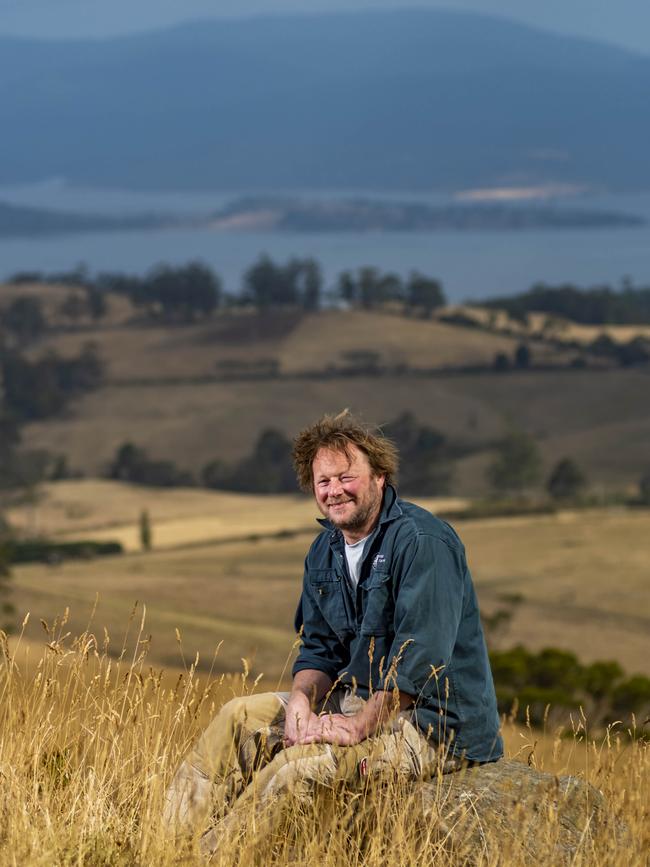
BIGGEST BONUS
Iain and Kate both work exceedingly long hours and rarely have time to watch TV or enjoy other entertainments.
They believe it a small sacrifice, allowing them to be doing something in which they genuinely believe, while spending quality time on the farm with their children.
“We have multiple quality moments with our kids because they’re involved in what we are doing, and we’re engaged with them,” Kate says. “They’re learning and we’re learning and it’s fun.”
Both are keen that others should realise what happiness such a rural lifestyle can bring.
“In my occupation as an emergency doctor,” says Kate, “I don’t see anyone having a good day. People come to see me in the emergency department and I see many people on their death beds.
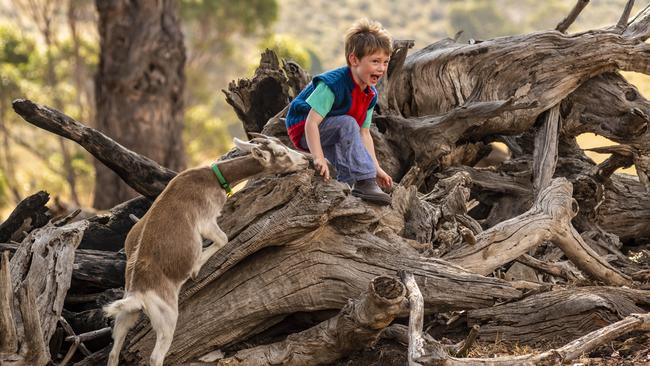
“You know, not one single person has ever said to me ‘Geez, I wish I could live a bit longer so I could watch that last season of Game of Thrones or whatever.
“It makes you realise that you have so little time. You think you have lots of time but we all have so little time. So why would you spend what little time you have on useless or pointless pursuits?
“Yes, things like television can be entertaining but you don’t need that much entertaining.”
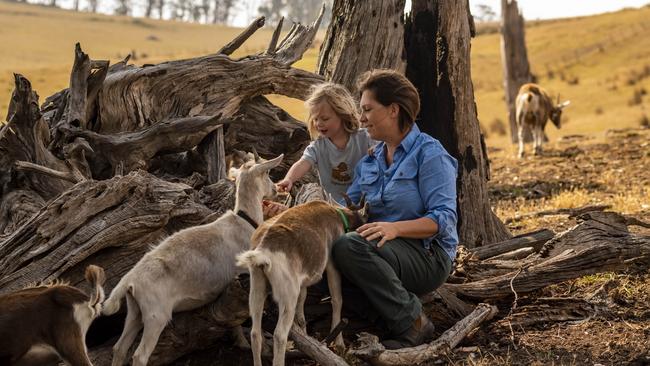
ORGANIC TRAIL
Although not certified organic, Leap Farm operates on organic principles.
“We decided not to go for organic status because I believe there are some animal welfare issues with organic status, and you don’t have to be sustainable to be organic,” owner Iain Field says.
“But the way we run the farm is on really robust ecological principles, which I was teaching.
“This way we have the best landscape we can and, if an animal is sick and the vet says, ‘please treat the animal in this way for the best possible outcome’, then that’s what we’ll do.
“We’re minimal chemical and minimal antibiotic, and we use both appropriately.
“If it means we can’t apply for organic status, which we could have done when we started, so be it. But we believe we have a much better farming system.”
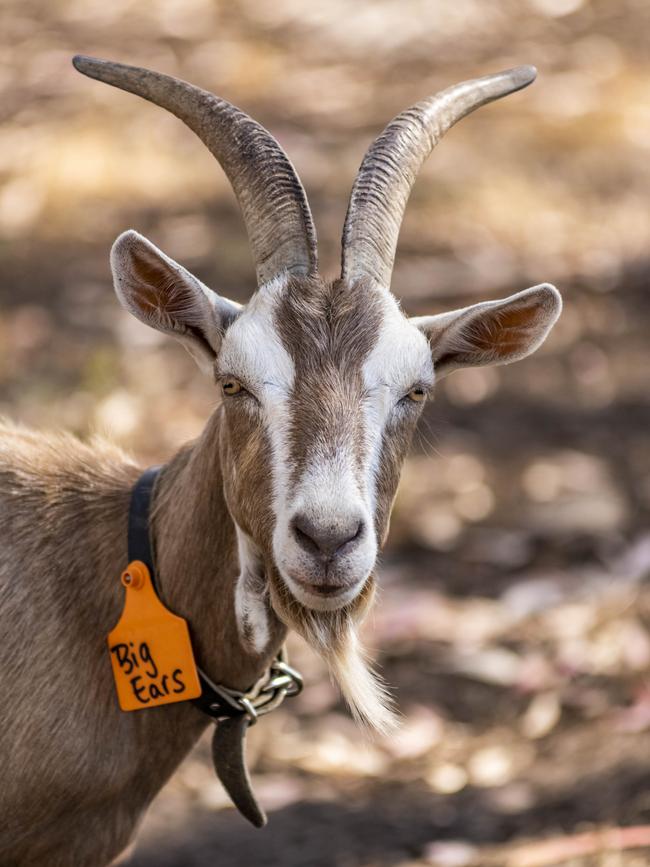
FARM FILE: Leap Farm and Tongola Cheese
Iain and Kate Field produce artisan cheeses while selling beef and goat meat from Leap Farm, a 107-hectare property at Copping, between Dunalley and Sorell, in southeast Tasmania. They sell direct to the public and through the local Bream Creek Farmers Market. Their Tongola cheeses are served by some of Tasmania’s top restaurants and they hope to be selling to the mainland within a few years.

